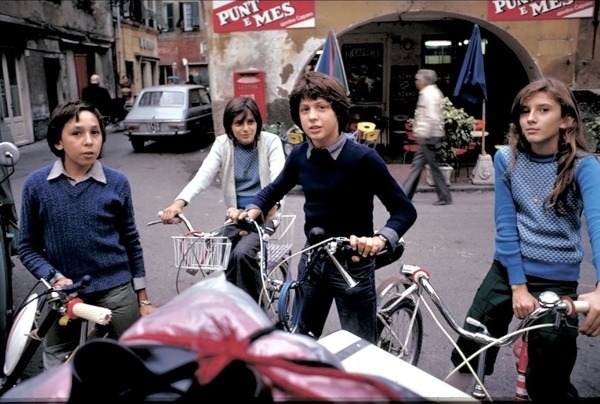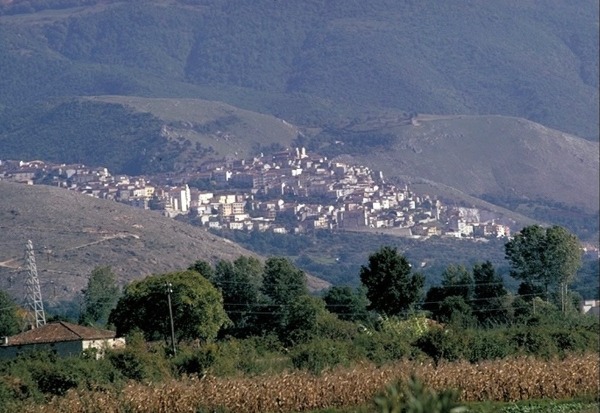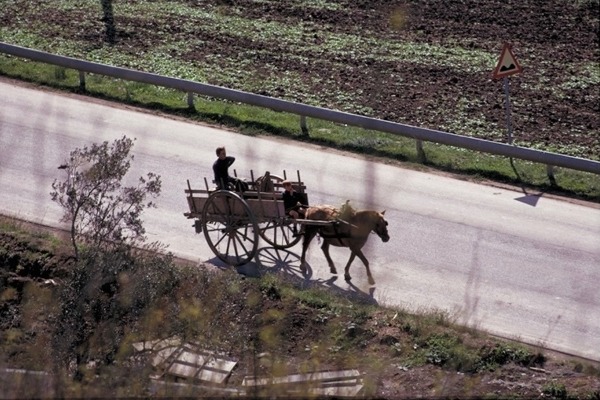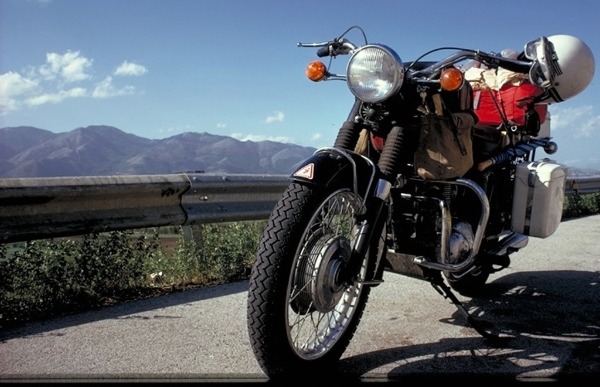From My Notebooks In 1973: Italy
28th September 2025 |
The last ten days have been a fairly comfortable prelude to the adventure, through familiar country, although I oddly failed to note the night outside Florence where, refusing to go to a hotel and finding all the camp sites locked I spent the night sleeping triumphantly on the bike under my umbrella.

An audience in Florence, the night I slept on the bike under my umbrella
Tuesday November 16th
Left Rome. Stopped in Latina for coffee.
Too hot. Tied chaps round luggage and lost them.
Spent the most miserable afternoon I can remember looking in vain over 25 km of road and then cursing, whining, wishing and regretting everything I had ever done. Not helped by impossibility of finding anywhere to put tent.
At last, at Larga Patrici, just before Naples, a beachy site. Felt better in tent. Terrible condensation in morning. Stopped to dry out tent on autostrada to Regio just after Pollo. Tent filled like a sail. Took 200mm pix of caterpillar and mountains. Also frames, 28mm, 3,4,5,6,7 of bike against mountain and villages. A little further on, a town against a mountain.

Then came off A3 at 1.15 to find some hot food. Buonapiticola provided a ‘Pizzeria’ where I asked for spaghetti. Passed old lady, just like Lucy, gathering vegetables in garden. Spaghetti at 300 lira was too expensive, but I regret the noise I made. Northern male strikes again.

From the autostrada
This business of the chaps has provoked a great many notions. I suppose a journey of this sort is bound to search out one’s weaknesses as well as expose other underlying traits. While the solitude is not so apparent nor the strain so monotonous as in a wilderness or on the high seas, it may in in its own way be as telling.
Alone in a yacht or on polar expeditions I’ve heard it said that men are inclined to swing between much greater extremes of misery and ecstasy. My own reaction to the loss of the chaps was naturally profound, but it seemed to eat deeper into me in a bitter fashion as I rode along in the night, going nowhere, looking for somewhere, almost crying with vexation, longing, self-pity and love for Jo, whom I seemed to have abandoned just as stupidly as I did the garment her loving hands had made to protect me.
As I rode through the night, from one locked campsite to another, I composed endless letters to her expressing my feelings and simply couldn’t wait to find somewhere to get my pen to paper. Yet as soon as I got somewhere and was settled into the tent, my anguish seemed to entirely evaporate, and I was forced to observe my own apparent fickleness with some disgust while feeling far too relieved to be really unhappy even about that.
This was written while waiting for the spaghetti to cook.

Back on A3. Viaducts between mountains become ever more spectacular. Took 28mm pic of one being built. At 4pm decided to leave A3 in search of a place to pitch my tent. Night falls here at about 5pm. Came to town called Roggiano. Lads shouted, children rushed up. Found a group of men in the square, in carefully pressed suits. One spoke English. They were curious and he spoke to me. I wanted to buy coffee. He indicated the alimentari shop which opened at 4.30. Bought an orange soda then went back to talk to them. Point is, I had time on my hands. Result was that eventually he said there’s an international centre up the hill. UNESCO he said. They would give me a bed if I said I was a journalist.
A cavalcade of young boys (where do the young girls go?) escorted me for 500 metres whooping and shouting as I maneouvered the Triumph among them. A young man with renaissance features and facial hair to match received me kindly in halting French (I spoke no Italian worth speaking with). He described the basic idea of the centre , which consisted of a number of low, flat buildings, pastel pebble-dash, steel-frame windows, in gravel paths and thin grass. It started as a centre for UNLA – the national campaign against illiteracy in 1949. It has become a cultural centre for the region. It has a staff of four full-time, himself, his father, another teacher and a secretary.
All the buildings were erected by the people of the region in their spare time, including bedrooms for those who have to come a long way to Roggiano from one of the other 14 villages scattered around the river Esaro. In a great communal hall a grave young woman in black brought a tray of coffee and cups and stood by us patiently while we drank. Earlier I had watched her with a vast bundle of laundry at least as tall as herself balanced on her head, walking easily through a doorway without an inch to spare on either side.
I was received by the father, Guiseppe Zanfini, in his office. When he had finished his telephone call he beamed across at me with such concentrated benevolence and hospitality that I wanted immediately to vote him into office, any office. Then without preamble and scarcely a pleasantry he launched directly and astonishingly into his story.
